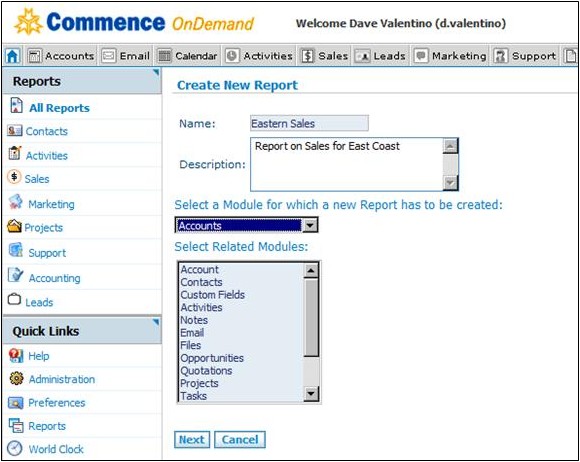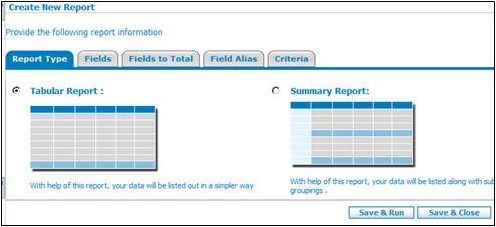Report Writer
From Commence CRM-Help
Contents
How to Create a Report
1. Click Reports in the Quick Links section. The Reports screen displays.
2. Click New Report. The Create New Report dialog displays.
 1. Fill in the name and description of the Report. The report name can contain letters and numbers. Do not use special characters such as quote marks.
2. Select the module which contains the primary data of your report
3. Select Related Modules: This may include additional data associated with each record. For example, if you are building a forecast report, the primary data for opportunities is in the Sales module. But you can add names, company information, or custom fields from the related modules.
4. Hold the CTRL key down and click multiple related modules.
1. Fill in the name and description of the Report. The report name can contain letters and numbers. Do not use special characters such as quote marks.
2. Select the module which contains the primary data of your report
3. Select Related Modules: This may include additional data associated with each record. For example, if you are building a forecast report, the primary data for opportunities is in the Sales module. But you can add names, company information, or custom fields from the related modules.
4. Hold the CTRL key down and click multiple related modules.
Select Tabular or Summary as desired. Summary will provide subtotals by groupings.
Selecting Report Fields:
- Click the fields in the Available Fields column while holding the CTRL key down.
- When all desired fields have been selected, click Add. These fields will be in your report. You may edit this at any time using Add and Remove.
- To rearrange the order of appearance, select a field and use Up or Down buttons. The order will appear left to right on the final report.
Selecting Fields to Total:
- Numeric fields from your selection will be available for totals and sub totals
- Click the ‘Fields to Total’ tab
- Check off the type of calculation preferred.
- If you selected Tabular report type, leave these blank
Using Field Alias
- You may rename any field in your report
- Click the ‘Field Alias’ and enter a new label for any field desired (i.e. Entity = Company Name)
Entering Report Criteria
- This is the most important part of building an accurate report
- Select the Record type of the first criteria item. This refers to the table that data resides. Example: City or State would be in the Entity table where the account address and other company information resides, Projected Close Date would be in the Opportunity module
- Now select the Field
- Select the Condition
- Enter the criteria
This row selects Opportunities that have a probability of greater than 50%. Add additional rows for very specific and valuable business reports. For “floating” days where the report always contains the “Next 60 Days” from today, use the ‘Period’ field as shown on the second row below, with any combination of ‘Less Than’ or ‘Greater Than’ as a conditions (use multiple rows for less than 90 greater than 60, e.g.). Use ‘Next xx days’ as criteria format. (30, 60, 90)
3. To Create a New Report, click the ‘New Report’ button
4. You may begin building your own search and selection criteria, very similar to creating a Saved Search.
5. Select a Module which is the table of primary infor-mation in your report (Sales = forecast data. Activity = activity, etc.) then select as many related modules as appropriate by holding CTRL + click each module. These are the fields of data that will be available. Follow along each tab and build your report
6. Use ‘Criteria’ to build the conditions as to which infor-mation will appear in the report. Add as many rows as needed
Errors
In the event your report has errors or shows a blank page, it is likely that you have not selected data from the proper module(s). Check the settings in your report and be sure you have selected the proper modules and respective fields.
Return to Reports



